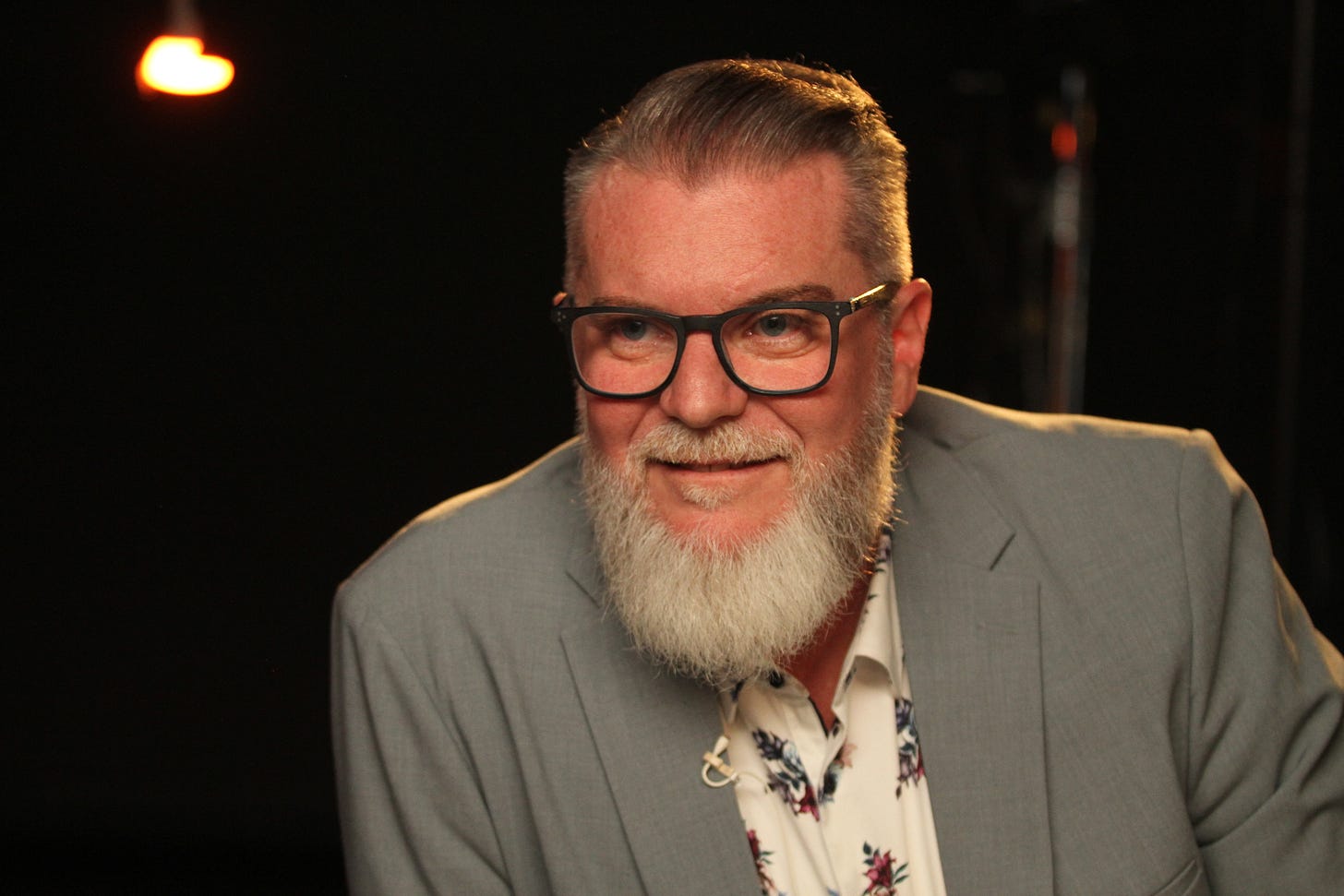A CEO's refreshing self-reflection: Seeing ourselves in unlikable characters
Plus, the audiobook is now live.
'Then I started looking in at myself and going, well, I actually behave like that...'
This was a nice moment!
Meet Greg O’Shaughnessy, CEO of CHR. This man doesn’t just have an exceptional beard… today, he’s going to teach you something about emotional intelligence.
Greg recently sat down with Paul, myself, and two others who had read at least some of our book (Holy Sh!t, It’s Only… Tuesday? and it’s now available in audiobook format… more on that below).
Eventually, Greg steered the conversation onto the hospital scene.
In this scene, Norm (the CEO of BRAGG Inc., a national cleaning company) is late for an awards night because of his daughter’s injured arm. He is stuck with her in the children’s emergency room, and while he waits for attention, he throws his weight around, putting pressure on the attending nurses ‘in true, narcissistic CEO fashion.’ This naturally made Greg angry—though it was a fictional character (‘fictional’) it made him think of all the people who act like this when things don’t go their way. Greg seemed to see through the facade:
Norm wasn't even throwing his weight around with the nurses and the doctors to actually get swifter care and good care for his daughter. He was doing it for himself. And he wasn't doing it to speed things up so they didn't get out of there quicker. That was part of it, but he wanted everybody that could hear him yelling to think that he was a big important person, right? And that just comes, that comes from insecurity.
I thought that was pretty astute , but Greg went even deeper.
And then I got a little bit further and started seeing myself in that person (Norm).
That's when I went back and read that chapter again.
Then I started looking in at myself and going, well, I actually behave like that...
Seeing yourself in unlikable characters

Don’t worry, Greg doesn’t throw tantrums in hospital emergency rooms (that I know of. Maybe this is not something people readily admit to). However, he recognises certain ‘Norm thoughts’ as being similar to his own. For example, going to one of his kid’s high school events and being impatient at having to watch the other children before his own comes out.
While the behaviour is totally different (Greg doesn’t lash out or complain about having to watch the other children, because he is a civilised chap) the overlap is in the attitude.
I would go as far as to say the value, perhaps the spiritual or evolutionary purpose of the Norm-like people around us (you may call them a**holes), is to help us learn. While at first glance they behave terribly and cause us anger, a more refined eye can appreciate they are simply a more exaggerated version of us. But for a crucial filter, between thought and behaviour, we might be more Norm-like ourselves (we probably are—at times). I don’t know about you, but seeing people act like a**holes always makes me want to avoid any similarity of any form. Thus, the filter that protects me from being Norm or a**hole-like, is buttressed by a**hole-like people.
Without a**hole people to learn from, I might be more of an a**hole myself. How curious.
As Viktor Frankl once said:
‘Between stimulus and response there is a space. In that space is our power to choose our response.’
What our responses to others say about us.
What I find interesting is what the responses we choose say about us—how our interpretations of situations symbolise where we’re at with ourselves. My rule of thumb is, the way we react to others says more about us than it does about them, and vice versa.
For example, someone criticising you for how you dress or look, suggests they are overly concerned with their own appearance (not that you can’t also sharpen up your wardrobe. Just because someone is projecting doesn’t mean they don’t have a point). The reverse is true—when you’re angry at someone for being lazy, or annoying, or behaving inappropriately, it probably says more about you—your insecurities, your fears and values, those aspects you do not want to see in the world.
That, I would guess, is the basis behind the anger we feel towards the Norms of the world, when they act up in hospital waiting rooms or snootishly in fancy restaurants. Anger is an interesting defence mechanism. It conveniently pushes away things that threaten us, in particular things we don’t want to acknowledge in ourselves. How often is the anger we direct towards others, rooted in ourselves?
One could answer always, when at the end of the day the anger we feel is inside us, not them.
It’s very easy to identify with good characters. It’s another thing entirely to pull Greg’s move and see aspects of ourselves in the not-so-good guys. It takes honesty, character, and other good stuff. You can check out Greg discussing this here on a clip I put on LinkedIn.
Exciting Update! Holy Sh!t, It’s Only… Tuesday?
In another exciting update, the book is now on several major audiobook platforms including audible (Amazon). You can check it out in the following places so far!
For the Audiobook, Paul and I read out alternate chapters ourselves.
You can imagine how long this took. How painful it was.
So please—please, please, please, please, please, for the love of the Almighty, check out the audiobook and make my suffering somewhat worthwhile. You can even check out a sample, first, on most platforms, or included in certain subscriptions like Spotify. Enjoy!






